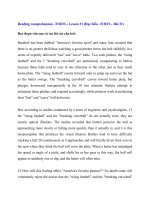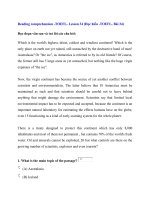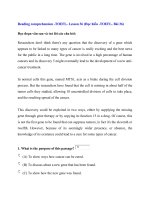Đọc hiểu -TOEFL- Bài 21 doc
Bạn đang xem bản rút gọn của tài liệu. Xem và tải ngay bản đầy đủ của tài liệu tại đây (80.63 KB, 7 trang )
Reading comprehension -TOEFL- Lesson 21 (Đọc hiểu -TOEFL- Bài 21)
Đọc đoạn văn sau và trả lời các câu hỏi:
Franklin D. Roosevelt, the 32nd president of the United States, was from a
wealthy, well-known family. As a child, he attended private school, had private
tutors, and traveled with his parents to Europe. He attended Harvard University,
and afterward studied law. At age 5 39 Roosevelt suddenly developed polio, a
disease that left him without the full use of his legs for the rest of his life. Even
through the worst of his illness, however, he continued his life in politics. In 1924
he appeared at the Democratic National Convention to nominate Al Smith for
president, and eight years after that he himself was 10 nominated for the same
office. Roosevelt was elected to the presidency during the Great Depression of the
1930s, at a time when more than 5,000 banks had failed and thousands of people
were out of work. Roosevelt took action. First he declared a bank holiday that
closed all the banks so no more could fail; then he reopened the banks little 15 by
little with government support. Roosevelt believed in using the full power of
government to help what he called the "forgotten people." And it was these
workers, the wage earners, who felt the strongest affection toward Roosevelt.
There were others, however, who felt that Roosevelt's policies were destroying the
American system of 20 government, and they opposed him in the same intense
way that others admired him.
In 1940 the Democrats nominated Roosevelt for an unprecedented third term. No
president in American history had ever served three terms, 25 but Roosevelt felt an
obligation not to quit while the United States' entry into World War II was looming
in the future. He accepted the nomination and went on to an easy victory.
1. What does the passage mainly discuss?
(A) political aspects of Roosevelt's life
(B) problems during the Great Depression
(C) Roosevelt's upbringing
(D) criticisms of Roosevelt's actions
2. Which one of the following statements is NOT mentioned in the passage?
(A) Roosevelt was elected during the Great Depression.
(B) Roosevelt voted for Al Smith.
(C) Roosevelt had difficulty walking during his presidency.
(D) Roosevelt supported strong government powers.
A
B
3. The phrase "took action" in lines 13 is used to illustrate the idea that
Roosevelt
(A) performed admirably
(B) exerted himself physically
(C) responded immediately
(D) got assistance
4. As used in line 14-15, the phrase "little by little" means that Roosevelt
(A) opened the smaller banks first
(B) opened the banks for minimal services
(C) opened the banks a few at a time
(D) opened the bank for a short time
C
C
5. The word "full" in line 16 could best be replaced by which of the following?
(A) packed
(B) loaded
(C) overflowing
(D) complete
6. Where in the passage does the author discuss Roosevelt's response to the
Great Depression?
(A) lines 1-6
(B) lines 6-10
(C) lines 10-16
(D) lines 16-21
D
C
7. The word "affection" as used in line 18 could best be replaced by which of
the following?
(A) fascination
(B) fondness
(C) lure
(D) appeal
8. The word "unprecedented" in line 23 could best be replaced by
(A) unimportant
(B) unheard of
(C) unjustified
(D) unhampered
B
B
9. It can be inferred from the passage that the people who liked Roosevelt best
were
(A) poor people
(B) bankers
(C) rich people
(D) average workers
10. In line 26, the author uses the word "looming" to indicate a feeling of
(A) reservation
(B) determination
(C) regret
(D) threat
D
D









